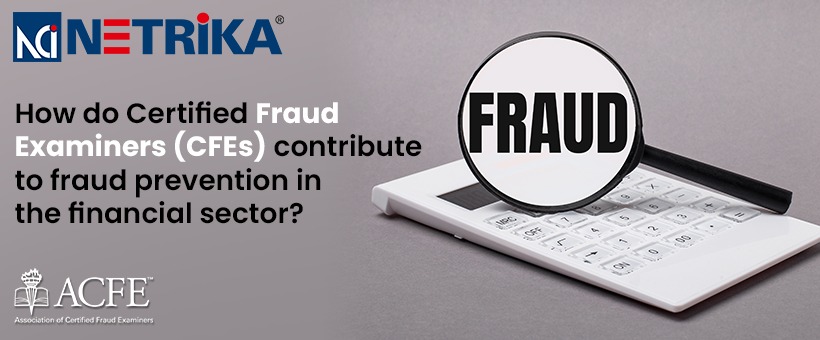News & Events
How do Certified Fraud Examiners (CFEs) contribute to fraud prevention in the financial sector?
- January 10, 2024
- Posted by: marketing@netrika.com
- Category: Blogs

A certified fraud examiner is a white-collar professional who has completed fraud identification, investigation, and mitigation training by ACFE (Association of Certified Fraud Examiners). CFEs work both independently and for a variety of employers, including the banking, investment sector, forensic investigation etc. Certified fraud examiners in the banking domain setting routinely investigate their employer’s accounts for signs of embezzlement or other forms of theft. In these verticals, CFEs are often called auditors and examine financial data to investigate potential cases of embezzlement, insurance fraud, money laundering, and other crimes.
It is the responsibility of a Certified Fraud Examiner (CFE) and anyone involved in identifying signs of fraud to look for facts that demonstrate the reality backed by proof. However, this proof needs to be sufficient to return the fraudster’s augmented reality to a factual chronology of events. In forensic accounting and fraud examination in the financial sector, a timeline, or visual demonstration, can serve as a foundation for the CFE or other involved expert to build the complete tale for a successful understanding of financial events as they are backed by evidence. This method provides direction by doing away with misleading narratives and substituting a factual, empirically backed chronology of events. CFEs are taught to search financial data for trends and abnormalities that could point to fraud. They can support auditors in identifying financial statement sections that are more likely to include fraud and in creating suitable audit processes to mitigate such risks. CFEs and auditors can collaborate to create efficient fraud prevention plans that lower a business’s risk of fraud. For instance, they can suggest altering internal controls or giving staff members fraud awareness training. Auditors may collaborate with CFEs to look into a matter more thoroughly if they have reason to believe that fraud has taken place. To gather information and compile a case against the scammer, CFEs might draw on their backgrounds in criminology, law, and accounting.
If a fraud case is tried in court, CFEs can be unbiased and expert witnesses. They can testify in court, explaining intricate financial information and assisting the jurors in comprehending how the fraud happened. Because they assist auditors in spotting, stopping, and looking into fraud, CFEs are essential to auditing in the financial sector. Their knowledge of criminology, law, and accounting can assist auditors in creating efficient fraud prevention plans and offer insightful analysis of a company’s financial results. CFEs can contribute to ensuring accurate and transparent financial statements, which is crucial for preserving public confidence in the financial system, by collaborating closely with auditors.
In the financial sector, trust is the currency that sustains the system’s reputation and integrity. Therefore, certified fraud examiners, with their expertise in forensic accounting, fraud risk assessment, compliance and risk education can act as vigilant guardians for the organisations. Their skills help them navigate the complex landscape of financial data and leverage cutting-edge technology to detect and prevent fraudulent activities as well as develop proactive measures to protect financial institutions in preserving their security posture.

